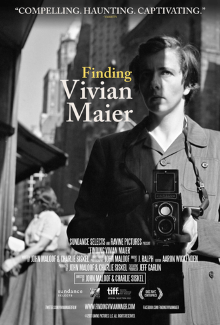
This is a fairly prominent documentary that my wife asked to add to our usual list and it’s no wonder why it made waves. The subject matter is so intriguing and so humanistic that it lends itself naturally to film. It’s also worth noting that nearly every documentary I’ve covered so far in this blog involves significant ethical questions and this one is no different. In fact, given that the producer and primary driver of this project, John Maloof, is the person who is mainly responsible for popularizing this artist after her death, the ethical issues here may be more thorny than usual and makes for a fascinating study in its own right.
As recounted by Maloof in Finding Vivian Maier, he first discovered her photographs after buying them at an auction. These and other personal effects were apparently being kept in a long-term storage space by Maier herself but she had not kept up with the rental payments for the space and so the owner had put up the items for sale. Maloof noticed that the photos were unusually good but was unable to find the photographer herself until her obituary appeared in a newspaper in 2009. He then had the photos scanned and uploaded to the Internet where it went viral and soon everyone was asking who is this photographer and why hadn’t anyone heard of her before.
It turned out that she had simply never shown her photographs to anyone before. As revealed through Maloof’s research, Maier lived a lonely life, had never married and had no close relatives. She had earned a living taking care of other people’s children and though her former employers and the now grown children who were under her care all remembered that Maier was almost never seen without a camera, none of them had seen her photos and had no idea how good it was. This documentary even claims that Maier even deliberately cultivated an aura of mystery and dissuaded attempts by people who tried to get closer to her and know where she came from. This makes it difficult to get a good picture of what kind of a person she was but this documentary certain tries its best to piece together some kind of portrait both from the effects that she left behind and the people who knew her.
I won’t comment about the photographs themselves. They’re obviously excellent but I’m not a photographer and have no special insight about what makes for good street photography. But as Maloof well knows, the interest in the photographs have generated intense curiosity over the strange life story and psychology of the woman who took them. One point in this documentary’s favor is the narrative it forges isn’t entirely coherent. It shows that Maier could both show great interest in the development of the children under her care and be abusive towards them. Maier may or may not have consciously affected a French accent. She may or may not have longed to be included as part of another family. It handles the ambiguity about her life and our lack of knowledge by honestly showing the different impressions people have of her, even if they may be contradictory, and allowing audiences to decide for themselves.
At the same time, it’s impossible not to feel at least somewhat uneasy with what Maloof is doing here. He is actively engaged in myth-making, in creating the definitive story of Maier’s life after she has died. Famous people always attract biographers of course, but in most cases these people became public figures while they were alive whereas Maier seems to have preferred to be a private person. Maloof doesn’t just show the world her photographs, he shows her letters, her clothes, her shoes. Maloof is certainly aware that this may not be what she wanted and tries to convince the audience through a letter she left behind she intended at some point to publicize her photographs. But even if this is true and it may not be, it’s not obvious that this extends to details of her private life.
The ethical issues are only exacerbated by the fact that Maloof himself has a clear financial interest in making the Vivian Maier story as big as possible. At one point in the film, he states that he wishes he could pay Maier money but he can’t because she’s dead and leaves it at that. I wish he’d at least acknowledge more directly that discovering the work changed his life and that he’d benefited substantially from it. It grates on my nerves when he states that he’s doing all that he does mainly to make sure that the world properly acknowledges that she is a great photographer as if he had purely selfless motives. Yet he fails to say that in addition to satisfying his, and the world’s, curiosity about her origins, he also traveled to France in order to find her closest living relatives in order to purchase the legal rights to her work from them. I think it is a conflict of interest that he is both the curator of her work and the person who stands to financially benefit the most from selling that work.
On balance, I agree that it would have been a terrible loss to the world if Maloof had never discovered Maier’s work. I’m uneasy about how her estate is being handled but I have no idea how else it could be done either. As for this documentary itself, it is competently made but is interesting mainly because of the strength of its subject matter and because Maloof was smart enough to realize early on how valuable it would be to document everything. But there’s an inherent voyeuristic quality to it that I dislike and I think that it is possible to admire Maier’s photographs without needing to pry into the details of her personal life.